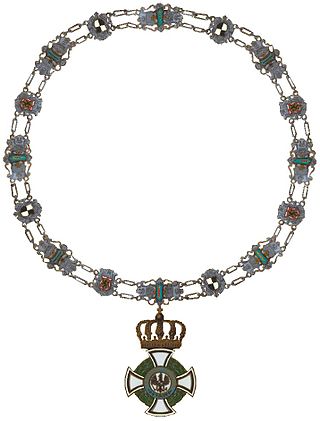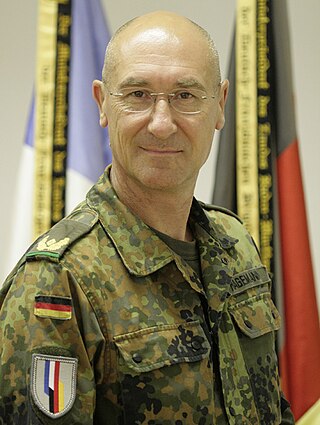Related Research Articles

The Biographical Dictionary of the Extreme Right Since 1890 is a reference book by Philip Rees, on leading people in the various far right movements since 1890. It contains entries for what the author regards as "the 500 major figures on the radical right, extreme right, and revolutionary right from 1890 to the present" . It was published, as a 418-page hardcover, in New York by Simon & Schuster in 1990 (ISBN 0-13-089301-3).

A Generaloberst was the second-highest general officer rank in the German Reichswehr and Wehrmacht, the Austro-Hungarian Common Army, the East German National People's Army and in their respective police services. The rank was equal to a four-star full general but below a general field marshal. The rank was equivalent to a Generaladmiral in the Kriegsmarine until 1945 or to a Flottenadmiral in the Volksmarine until 1990. It was the highest ordinary military rank and the highest military rank awarded in peacetime; the higher rank of general field marshal was awarded only in wartime by the head of state. In general, a Generaloberst had the same privileges as a general field marshal.

The Marinebrigade Ehrhardt, also known as the Ehrhardt Brigade, was a Freikorps unit of the early Weimar Republic. It was formed on 17 February 1919 as the Second Marine Brigade from members of the former Imperial German Navy under the leadership of Hermann Ehrhardt. The Brigade was used primarily in the suppression of the Bavarian Soviet Republic and the First Silesian Uprising, both in the first half of 1919. In March 1920, faced with its imminent disbanding by orders of the government in Berlin, the Marine Brigade was one of the main supporters of the Kapp Putsch that tried to overthrow the Weimar Republic. After the putsch failed and the Brigade was disbanded in May, many of the former members formed the secret Organisation Consul under Ehrhardt's leadership. Before it was banned in 1922, it carried out numerous assassinations and murders in a continuation of the attempts to overthrow the Republic.


The House Order of Hohenzollern was a dynastic order of knighthood of the House of Hohenzollern awarded to military commissioned officers and civilians of comparable status. Associated with the various versions of the order were crosses and medals which could be awarded to lower-ranking soldiers and civilians.

The government of Nazi Germany was a totalitarian dictatorship governed by Adolf Hitler and the Nazi Party according to the Führerprinzip. Nazi Germany was established in January 1933 with the appointment of Adolf Hitler as Chancellor of Germany, followed by suspension of basic rights with the Reichstag Fire Decree and the Enabling Act which gave Hitler's regime the power to pass and enforce laws without the involvement of the Reichstag or German president, and de facto ended with Germany's surrender in World War II on 8 May 1945 and de jure ended with the Berlin Declaration on 5 June 1945.

The Freikorps Oberland was a voluntary paramilitary organization that, in the early years of the Weimar Republic, fought against communist and Polish insurgents. It was successful in the 1921 Battle of Annaberg and became the core of the Sturmabteilung (SA) in Bavaria while several members later turned against the Nazis.

General of the Infantry is a former rank of the German army. It is currently an appointment or position given to an OF-8 rank officer, who is responsible for particular affairs of training and equipment of the Bundeswehr infantry.

General der Flieger was a General of the branch rank of the Luftwaffe in Nazi Germany. Until the end of World War II in 1945, this particular general officer rank was on three-star level (OF-8), equivalent to a US Lieutenant general.
Events in the year 1907 in Germany.
Events in the year 1893 in Germany.
Events in the year 1891 in Germany.
Events in the year 1885 in Germany.

Bekenntnis der Professoren an den Universitäten und Hochschulen zu Adolf Hitler und dem nationalsozialistischen Staat officially translated into English as the Vow of allegiance of the Professors of the German Universities and High-Schools to Adolf Hitler and the National Socialistic State was a document presented on 11 November 1933 at the Albert Hall in Leipzig. It had statements in German, English, Italian, and Spanish by selected German academics and included an appendix of signatories. The purge to remove academics and civil servants with Jewish ancestry began with a law being passed on 7 April 1933. This document was signed by those that remained in support of Nazi Germany.
The German foreign office had a sizable network of diplomatic missions when Nazis came to power in 1933. While it was a deeply traditional and elitist organisation within the German civil service, it enthusiastically helped the Nazis prosecute an ambitious foreign policy.
References
- ↑ Hoess et al., pg 201
- ↑ Axis History Forum